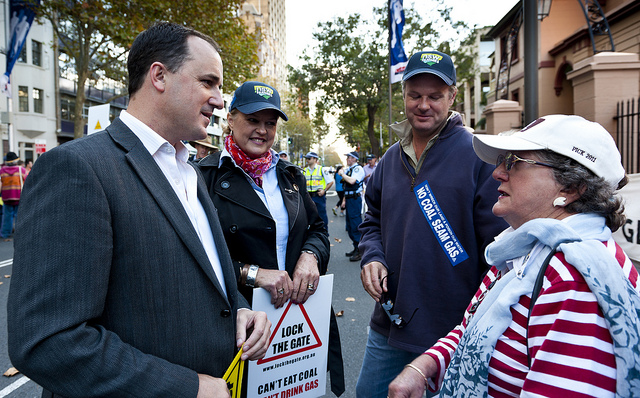Politicians seeking election this year must communicate more effectively with potential voters than they did in 2010
Indifference – or active hostility – to the democratic process is one of the defining issues of our time, and with the 2015 General Election just around the corner, the need for politicians to engage with voters is high. Rosalynd Southern and Kingsley Purdam argue that explain that – judging by the last General Election – many of them could do better.
Good communication skills and an ability to connect with the electorate are key attributes for MPs. But in the UK MPs undertake their roles in different ways and do not have a defined job description. Research has highlighted how the electorate wants MPs to be predominantly focused on constituency issues. This requires an ability and commitment to communicate directly with the electorate.
We conducted an ethically approved study of the responsiveness and engagement levels of 775 parliamentary election candidates in marginal constituencies prior to the last General Election. An email was sent to the candidates in the first week of the election campaign from a hypothetical voter. The voter requested information on the candidate’s and party’s policies and what they planned to do about the issue of‘employment opportunities for graduates’. Such a covert methodology is vital in order to gain a real insight into how politicians are communicating in practice. It is notable that one MP has called for politicians to be subject to greater scrutiny including mystery-shopping checks as part of quality assurance measures.
Overall 82% of the candidates had some form of email address that could be identified or had an online contact form. In total, 373 email responses were received (49%). The response rate was similar across the candidates from different parties, except for the British National Party whose candidates were by far the least likely to respond.
Ninety per cent of candidates who sent a reply did so addressing the voter by their name. This represents a high level of personalisation. Some candidates referred to their own lives and experiences, expressing empathy. A timely response was important. One in three replies were received the same day. Most candidates who replied did so within three days. However, just 4% of candidates had set up an auto-response system to acknowledge emails. Moreover, only six subsequent emails were received from candidates, suggesting that the voter’s details and political concerns had not been added to the candidates’ campaign databases or linked to a communications strategy.
A textual analysis of the replies suggests that only 27% of candidates provided a directly relevant answer to the question asked by the voter; however, a further 42% of responses contained information that was at least related to the question posed. Labour Party candidates were most likely to provide a directly relevant answer. Candidates from smaller political parties, including UKIP and the BNP, were much less likely to give a direct answer.
It emerged in follow-up interviews with candidates that many were concerned about communicating online and being ‘on the record’. One candidate commented, ‘I am very cautious of going off message via email or social media. A slip up can be distributed far and wide before you know it…and it is written proof…I wouldn’t want to embarrass my party’.
Overall the evidence from our research suggests there was a substantial level of engagement amongst politicians. However, the response rates and content relevance fell below the expectations of many public and private sector customer service standards. Such organisations may, of course, have considerably more resources. Even so, this was a missed opportunity for politicians to engage with the electorate in a direct way, and the lack of two-way communication puts at risk the extent to which the electorate can hold politicians to account. Moreover, the electoral benefits of localised and personalised campaigning and frequency of contact have been widely documented.
Politicians need to be responsive and provide information on policies and decisions in order to engage the electorate in democracy. Of course email communication is just one form of contact, and politicians and their party offices may be being overwhelmed by the communications they receive. If so, resource constraints are hindering the renewal of democratic representation.
Two-way communication and campaigning provide opportunities outside the limitations of the broadcast media and set-piece campaign tools. As Richards and Smith have argued, there is a need for a new openness and increased accountability amongst politicians. The web tool TheyWorkForYou, developed by mySociety, is a hugely valuable resource for the scrutiny of MPs’ activity, but it is notable that it was established by an organisation external to Parliament, rather than being a formal performance audit.
Increased communication and dialogue could transform the model of democratic representation in the UK, giving politicians more scope to explain their policy positions and decisions. Citizen engagement is not solely the responsibility of the citizen; it requires a democratic system that fosters it. Politicians now have many more tools available to communicate and engage with the electorate. The question is, will they use them?
—
Full research findings are published in: The Changing Representation Interface – Democracy and Direct Contact with Politicians by Southern, R. and Purdam, K. (2015) CMIST Working Paper, University of Manchester.
Note: this post originally appeared on Manchester Policy Blogs and is reposted with the permission of the author. it gives the views of the authors, and not the position of Democratic Audit UK, nor of the London School of Economics. Please read our comments policy before commenting.








 Democratic Audit's core funding is provided by the Joseph Rowntree Charitable Trust. Additional funding is provided by the London School of Economics.
Democratic Audit's core funding is provided by the Joseph Rowntree Charitable Trust. Additional funding is provided by the London School of Economics.
Politicians seeking election must communicate more effectively with potential voters than they did in 2010 https://t.co/wdtvQMt55m
Surely you first have to tackle the question of party line and its effects on supposedly “personal” responses during an election. Most candidates will simply parrot a specially prepared party line on almost any issue. So what you are really saying is that the Labour Party has the greatest control and the greatest number of prepared answers for any question you care to throw at it. It is not, at the end of the day, about “communication”. It is about which party is most centrally controlled and able to affect that it is responding in a meaningful manner.
As long as everything has to be centrally controlled and the media jumps heavily on anyone who appears to even remotely differ, things will just become more centrally controlled, not less.
Is there also really any point in quibbling over the minutiae of how long it took for someone to respond if all they are giving you is some centrally ordered response. It would be useful to dig a bit deeper and analyse responses to judge the dedgree to which you are being fobbed off. It is part and parcel of disaffection with the political process and more important.
Politicians seeking election this year must communicate more effectively with potential voters than they did in 2010 https://t.co/ZMCAkIvO3s
Politicians seeking election this year must communicate more effectively with potential voters than they did in 2010 https://t.co/Dadg3z8fw1